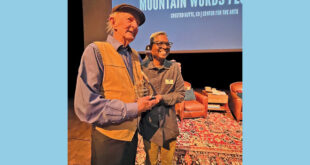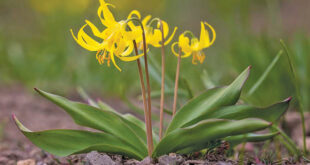Part II: Growing during the coronavirus crisis
By Dawne Belloise
“To plant a garden is to believe in tomorrow.”—Audrey Hepburn
World Wars I and II weren’t the only spurs for Americans to grow their own food in home gardens throughout the 20th century. In the decade-long Great Depression that hit the United States beginning in 1929, hundreds of thousands of people were unemployed with dire consequences. Non-existent wages necessitated the resurgence of the previous two wars’ Victory Gardens.
As necessity has been deemed the mother of invention, so COVID-19 has resurrected the call for self-reliance in producing one’s own food in home gardens. Here in the Gunnison Valley, Mountain Roots Food Project has initiated the Victory Garden Revival to help high-altitude growers, to connect experienced gardeners with novices, to share resources and knowledge and to give consultations and, if you register your home garden on their website, whether it’s container gardens, raised beds or greenhouse, you get some pretty cool free swag along with all that valuable information.
The CSU Extension Agency also jumped on board with the Victory Garden Revival, offering 24 lessons for beginning gardeners on their website along with downloads and videos that will walk novices through everything they need to know to get started and provide background knowledge, while Mountain Roots provides the boots on the ground.
One pair of those boots on the ground belongs to Sean Kohler, the consultant for the Victory Garden Revival. With his background in outdoor and experiential education through guiding backpacking trips, it was an easy jump from teaching people to feel more connected to the land to teaching them the love of gardening. “Traveling through southeast Asia, I was talking to people who were farming or who had an incredibly strong connection to the land,” he says of his months spent traveling through Cambodia and Vietnam. “The connection came through the food.”
Kohler also recruits and consults with master gardeners from the CSU Extension program, student volunteers who are taking their Master Gardener courses.
When Kohler checks in with the valley’s local gardeners he helps them find needed resources like soil or seeds and answers questions about plant disease or infestations. “If it throws us for a loop we’ll consult the Master Gardeners and snap some photos to send off to the head of CSU Extension. We are encouraging gardeners of any experience level to be a part of this. If they’re Master Gardeners it’s a great opportunity to share their knowledge and mentor other gardeners in the valley. So we’ve got something for any and every skill level with this program.”
Tracy Wheeler shares that she’s been gardening in the valley for about 10 years now. “I have a greenhouse and two small beds. Last year, I added another large bed. This year, COVID-19 inspired me to want to try to be self-sustaining.” She’s in the process of building another greenhouse with solar, “So we can grow all year-round and I also built another bed. Gardening is my passion. It makes me feel alive.”
In Crested Butte South, Jeff Dautrich says he’s been preparing for the possibility of a worst-case scenario such as we’re currently experiencing. “Honestly, I have been sort of preparing and moving toward being ready for something like this prior to COVID-19. I put more work into my garden this year than ever before, partly due to the fact that I had a lot of free time on my hands because of COVID, but there is certainly a part of me that has been preparing.” Dautrich is a master at food preservation and fermentation.
“We were tired of sitting around during the pandemic and wanted to create a purpose for our quarantine time,” says Erica Rasmussen, “so we actually built a greenhouse and dubbed it the Pandemic Project to grow lots of fruits and vegetables. Besides wanting to make meaningful use of time we would never get back, we also wanted to be more self-reliant on our own ability to grow food for our family. It’s also a fun way to get our kids to eat healthy and see the progress. And the Pandemic Project turned out great!” she says of their home gardens that produce raspberries, blueberries and strawberries. They planted two apple trees, two pear trees and a fig tree, all of which their greenhouse supports.
Living in her parked RV on a friend’s property, Kathleen Mary was able to plant container gardens. “I started almost immediately when I realized how empty the shelves were,” she says of trying to find food in grocery stores during the pandemic. “I planted my celery bottoms, my remaining garlic cloves and my Romaine bottoms and then I started planting any seeds I could get my hands on. This was back in March. I figured that food shortages were inevitable.”
Novice gardener Nia Morales received a bounty of free starters from Alpengardener in Crested Butte South back in April. She had recently moved to Gunnison and says, “I had been trying for years to garden on my rooftop deck in Crested Butte. Here in Gunnison, I have a yard, and with COVID-19 happening, I wanted to learn to grow my own veggies because I couldn’t afford a CSA this year. This is my first time gardening besides container planting. I have a few things planted now and am building two garden boxes for the rest.”
Bailey Valian also benefited from Alpengardener’s giving spirit. “While we’ve been wanting to [start a garden] for a few years, we felt the push with COVID-19 and then Alpengardener was generously giving away free starters, so we started a container garden.”
Meanwhile, with food shortages mounting, Elise Kristi took the opportunity to enlarge her garden. “It was in the plan but we definitely fast-tracked it. And usually, I’m pretty experimental, but this year I’m pretty serious about it.”
Steve Utech’s garden laid dormant for a decade, but he says, “I was off work for a minute because of the virus so I got it back going and fixed it up a little. Brenda Fleming was speaking of the health benefits of fresh veggies so I got inspired.”
Adge Marz Lindsey started her growing season in her greenhouse earlier than ever. “And we replenished our chickens, spring babies bring fall eggs,” she notes.
Mountain Roots also raises chickens for their CSA boxes and with people in the valley newly raising chicks because of the food insecurity caused by the coronavirus, Mountain Roots helps them identify and solve issues that might arise with the fowl.
Holly Conn, executive director of Mountain Roots, emphasizes that the organization wants people to be part of the solution, meaning, to help provide food for others in need if the home gardeners have extra harvest to share. Their Backyard Harvest program has been up and running for five years and Conn says, “Anybody who has excess can donate it and our food rescue team will collect your excess harvest once a week. From arugula to zucchini, we combine efforts and we have a lot when we put it all together and create food boxes for people in need and deliver to their houses.”
Mountain Roots partners with local ranchers to supply beef and pork as well for their weekly CSA boxes. “You can buy into a fruit and vegetable box or just a meat share or both. So, if you have a vegetable garden but need fruit, you can get just a fruit share, or just a meat share,” Conn says.
Mountain Roots is expanding their reach in the north valley, recently adding another growing space through a partnership with the Crested Butte Land Trust to use conserved public working lands to produce more gardens. Conn explains, “It’s a window into working lands, to illustrate to the public the many different ways that conserved land can be utilized to meet community needs. One is called Glacier Farm, on the former Nicolai ranch, at the corner of Cement Creek Road. It’s around 40 acres. We won’t be using it all but a lot of people in our valley want to grow food.”
For more information and to register your Victory Revival Garden online, visit mountainrootsfoodproject.org. For the CSU Extension, visit gunnison.extension.colostate.edu (970) 641-1260.
 The Crested Butte News Serving the Gunnison Valley since 1999
The Crested Butte News Serving the Gunnison Valley since 1999





